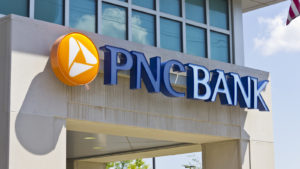
It’s not been an easy year for bank stocks. The Invesco KBW Bank ETF (NASDAQ:KBWB) tracks the performance of the KBW Nasdaq Bank Index, a collection of large national US money centers, regional banks and thrift institutions.
Both the fund and index are rebalanced and reconstituted quarterly. KBWB currently has 25 holdings with an average market capitalization of $103 billion and an average price-to-earnings ratio of less than 9x. Year-to-date, it’s down more than 20%. Worse still, it’s down nearly 26% over the past five years. This has been dead money for at least half a decade, if not for dividends. As Barron’s recently pointed out, JPMorgan Chase (NYSE:JPM) is the only big bank in positive territory in 2023.
Barron’s article focused on the possibility that the demise of bank stocks will lead to consolidation in the industry. You’re likely to see a bunch of mergers between mid-level banks that currently can’t compete effectively with the JPM’s of the world.
As you wait for your bank stock to get bought out, getting paid to wait through dividends makes sense. Here are three high-yield bank stocks to buy that allow you to do that.
PNC Financial (PNC)

When I was considering regional bank stocks, I immediately thought of the PNC Financial (NYSE:PNC) ads. The bank’s history dates back to 1852, nearly a decade before the Civil War. Today, the Pittsburgh-based bank holding company is the sixth-largest bank by assets, with $554.1 billion. Its deposit base is a nice mix between commercial ($204 billion) and consumer ($222 billion), with $223.2 billion in commercial loans and 101.3 million in consumer loans.
Like most regional banks, PNC’s share price was hurt by the Silicon Valley Bank meltdown earlier this year. Its shares are down 26% year-to-date and nearly 16% over the past five years. While flawed, its five-year return is up when compared to KBWB over the past five years. PNC conducted a recent survey of small and mid-sized businesses. Approximately 77% of the respondents are highly optimistic about their prospects over the next six months, up 28% from a year ago. The level of optimism is the highest in the past 21 years.
The last major acquisition it made was in 2021, paying $11.6 billion for the U.S. subsidiary of Spanish bank Banco Bilbao Vizcaya Argentaria (NYSE:BBVA). This is a stock to keep an eye on in the next 12-18 months. It’s a buyer, not a seller.
Citizens Financial (CFG)

Citizens Financial (NYSE:CFG) is nearly one-quarter the size of PNC by market cap. The Rhode Island-based bank has over 1,100 branches in 14 states and the District of Columbia. It finished the second quarter with $178 billion in deposits and $151 billion in loans. Its Q2 2023 report said it hired 50 senior bankers in the first half of the year.
The significant growth driver is the bank’s push into private banking. In October 2022, it announced plans to launch the Citizens Private Client. The unit focuses on customers with $200,000 in deposits or investments. It plans for the unit to break even by the middle of fiscal 2024, adding to profits by the end of 2024. By the end of 2025, it expects the unit to have $9 billion in loans and $11 billion in deposits while boosting annual earnings per share by approximately 5%.
Of the 24 analysts covering its stock, 13 rate it overweight or an outright buy, with a median target price of $34, 18% higher than where it’s currently trading. Additionally, since it is operating in some attractive markets, I could see someone much larger making a play for CFG.
First Horizon (FHN)

First Horizon (NYSE:FHN) almost became a subsidiary of one of Canada’s largest banks. Unfortunately, with the Silicon Valley Bank debacle, First Horizon’s stock price crumbled, making the deal virtually impossible to complete at the $25 a share price Toronto-Dominion Bank (NYSE:TD) first offered to pay in February 2022. It didn’t help that regulatory hurdles accelerated after the regional banking troubles. It just wasn’t meant to be. However, First Horizon remains an intriguing buy for a larger bank willing to go back to the negotiating table.
First Horizon is another regional bank with a long history. The bank got its start in 1864 in Memphis. Several mergers later, it has $85 billion in assets and operates in 12 U.S. states in the south, with $65 billion in deposits and $61 billion in loans. First Horizon added 32,000 new clients in the latest quarter, bringing $3.5 billion in additional deposits. During the quarter, deposits increased by $3.0 billion, while deposits rose by $2.3 billion. In Q2 2023, its net interest margin (NIM) was 3.38% during the quarter. JPMorgan’s annualized NIM was 3.37%.
In the hands of a bigger bank, First Horizon could be a very valuable acquisition.
On the date of publication, Will Ashworth did not have (either directly or indirectly) any positions in the securities mentioned in this article. The opinions expressed in this article are those of the writer, subject to the InvestorPlace.com Publishing Guidelines.





